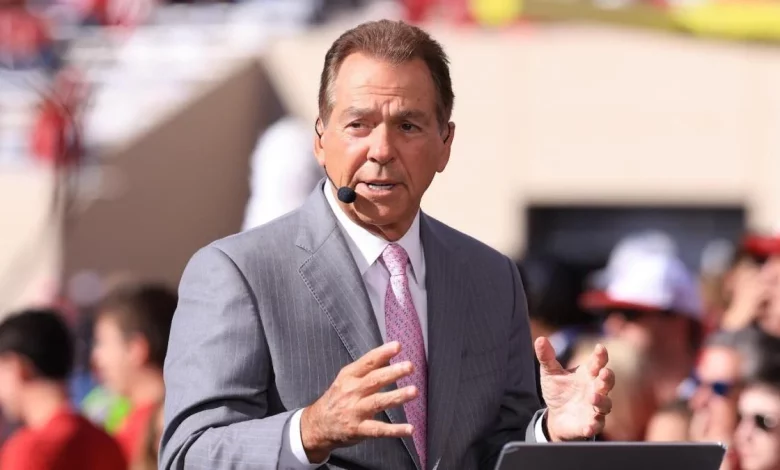Nick Saban won a Sports Emmy award in his first season as a television analyst, adding another prestigious accolade to his impressive career.

Nick Saban’s career is a testament to excellence, resilience, and the relentless pursuit of perfection. As one of the most successful college football coaches of all time, Saban’s impact on the game has been felt in numerous ways—from his record-breaking achievements at the University of Alabama to the standard he set for both coaching and leadership. But in an unexpected and impressive turn, Saban has now added another accolade to his already overflowing trophy case: a Sports Emmy Award in his first season as a television analyst.
The award, given to him for his work as a television analyst during college football broadcasts, speaks volumes about Saban’s natural charisma, sharp insights, and ability to connect with an audience. While many fans and sports analysts have long appreciated Saban’s insight into the game, few could have predicted that his transition from the sidelines to the broadcast booth would be so successful. In this article, we explore Saban’s remarkable journey to this point, how his first season as a television analyst unfolded, and what this award means for his legacy—both as a coach and as a new figure in sports broadcasting.
The Transition from Coach to Analyst: A New Frontier for Nick Saban
Nick Saban’s name is synonymous with college football coaching greatness. His tenure at Alabama, where he won six national championships and built a dynasty, is part of the sport’s most storied eras. Known for his meticulous attention to detail, his relentless pursuit of excellence, and his ability to adapt to the evolving nature of the game, Saban earned a reputation as one of the sharpest minds in football.
After announcing his retirement from coaching, the sports world waited to see what his next move would be. Many assumed he would quietly fade into retirement, spending time with his family, enjoying his well-earned rest, and perhaps offering occasional thoughts on the game through media appearances. However, Saban had other plans.
In 2024, after wrapping up one of the most successful coaching careers in history, Saban took on a new challenge—sports broadcasting. His first venture into this new arena came when he signed on to be a television analyst for major college football broadcasts. His presence on broadcast teams immediately stood out, as his insights into the game were unmatched, his passion for football evident, and his ability to break down plays and strategies compelling to both casual fans and die-hard enthusiasts alike.
While many athletes and coaches who transition into broadcasting often struggle to find their voice or to adjust to the nuances of a different kind of performance, Saban’s success came quickly. It was clear that he was not simply talking about football for the sake of it—he was bringing his championship-level expertise and unparalleled knowledge of the game to the table.
Saban’s Natural Charisma on Air
From the outset of his broadcasting career, it was evident that Saban’s transition into television was not only seamless but also impressively smooth. His first season as an analyst showcased his ability to speak with authority, offer valuable insights, and captivate an audience with his thoughtfulness and intelligence.
One of the most striking aspects of Saban’s broadcasting style is his clarity and precision when analyzing complex football strategies. While his coaching tenure was marked by his ability to simplify complicated concepts for his players, Saban’s analytical style on television similarly breaks down intricate football plays into understandable and engaging commentary. His ability to convey sophisticated football strategies in a clear and accessible way helped him connect with a wide range of viewers—whether they were casual fans tuning in for the game or seasoned analysts looking for a deeper dive into the Xs and Os of college football.
However, it wasn’t just his expertise that won over audiences—it was also his natural charisma. Saban’s authentic love for the game and his approachable personality resonated with fans who had only previously seen him on the sidelines in a high-pressure environment. On television, he had the opportunity to show a different side of himself: one that was more relaxed, personable, and capable of delivering moments of humor and insight in equal measure.
In a world where sports broadcasting can often feel formulaic or overly scripted, Saban’s ability to balance expert analysis with genuine, candid moments made him a unique presence in the booth. His candidness about the challenges of coaching, the intricacies of the game, and the changing dynamics of college football provided a refreshing perspective. He was not just speaking as a former coach; he was engaging as a fan of the game himself.
The Role of Mentorship: Saban’s Influence in the Broadcast Booth
Though Saban’s sports Emmy award was based on his individual work as a television analyst, it’s important to note the environment in which he thrived. Broadcasting is often a collaborative effort, and Saban’s natural leadership and mentorship skills, honed over decades of coaching, played a significant role in his successful integration into the broadcasting world.
Working alongside veteran analysts, play-by-play announcers, and fellow analysts, Saban was able to contribute both his football expertise and his leadership acumen. In many ways, the same qualities that made him an elite coach—his ability to elevate those around him, his dedication to preparation, and his innate understanding of how to present complex ideas to an audience—translated seamlessly into his new role.
For many in the broadcast booth, Saban’s presence was both an inspiration and an asset. Analysts and producers alike benefitted from his knowledge and understanding of the game, and Saban was able to bring a fresh perspective to the television broadcasts, offering deeper insights into the strategic intricacies of games. His ability to break down plays and anticipate key moments before they happened added a layer of excitement to the broadcasts that had not been seen before.
Saban’s mentorship, even in his new role, was clear—whether it was helping fellow analysts understand the complexities of a particular play or offering insights about team dynamics and coaching strategies, his influence was felt across the entire broadcast team.
The Impact of Saban’s Emmy Win
The recognition of Nick Saban’s excellence in his first season as a television analyst is encapsulated by the Sports Emmy Award he received. Winning this prestigious award after just one season speaks volumes about his natural ability to excel in any arena he chooses. The Sports Emmy, a mark of distinction in the world of sports media, is typically awarded to those who have demonstrated exceptional skill, creativity, and insight in the field of sports broadcasting.
Saban’s win further solidifies his place as one of the most influential figures in the history of college football—whether as a coach, an analyst, or a broader figure in the sport’s media landscape. The award is a testament to his deep understanding of football, his ability to convey that knowledge to an audience, and his overall contribution to the sports broadcasting community.
For Saban, this recognition also marks a new chapter in his career. It’s rare for someone who has been so entrenched in the coaching world to make such a successful transition into media. His win suggests that his influence will extend beyond the football field, and he may have a long and successful career ahead of him as a broadcaster, should he choose to pursue it.
What Saban’s Emmy Win Means for His Legacy
As Saban continues to build his legacy, the addition of a Sports Emmy award in his first season as an analyst provides a unique layer to his already storied career. Known as a coach who elevated every program he touched and redefined the standard for success in college football, Saban’s Emmy win suggests that his contributions to the sport won’t just be remembered in the context of his championships but also in the broader media landscape.
The Emmy symbolizes more than just Saban’s skill as an analyst; it represents his ability to adapt and excel in any endeavor. In a coaching career that spanned decades, Saban never stopped evolving—constantly adjusting to new challenges and new generations of players. That same adaptability has carried over into his role as a television analyst, and his win further reinforces the idea that Saban is one of the most versatile figures in the history of sports.
Moreover, his Emmy victory may inspire other coaches to follow in his footsteps and explore the world of sports broadcasting. If a figure as revered as Saban can successfully transition from coaching to analysis, it sends a message to the broader sports community about the value that experienced coaches bring to television networks.
Looking Ahead: Nick Saban’s Future in Broadcasting
As for what comes next, Saban’s future in broadcasting is wide open. While he is likely to continue offering his insights on major college football games, his first season’s success raises the question of whether he might take on a larger role in the media world. Could Saban one day host his own show? Could he take on an expanded role in ESPN’s coverage of college football, offering more than just analysis during game time?
Given Saban’s demonstrated ability to adapt and his deep knowledge of the game, it seems likely that his influence on college football broadcasting will continue to grow. Whether he stays in the booth for another season or expands his reach to other areas of media, his legacy will only continue to evolve. And for fans of the game, that means more opportunities to hear from one of the sport’s most respected voices.
A True Legend, On and Off the Field
Nick Saban’s win of a Sports Emmy Award in his first season as a television analyst further cements his place as one of the most influential figures in college football. From his legendary coaching career to his impressive transition into broadcasting, Saban’s ability to adapt and excel in new environments speaks to his unique skill set and lasting impact on the sport.
As he continues to shape the world of college football, both on and off the field, Saban’s Sports Emmy is a fitting addition to a career that continues to inspire and elevate the sport of college football in ways few others can. His influence will undoubtedly continue for years to come, not only through his coaching legacy but also through his insightful contributions to the broadcast booth.
Let me know if you’d like to explore any other facets or make further adjustments to the article!









